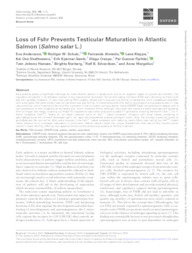Loss of fshr prevents testicular maturation in Atlantic Salmon (Salmo salar L.).
Loss of fshr prevents testicular maturation in Atlantic Salmon (Salmo salar L.).
Author(s): ANDERSSON, E.; SCHULZ, R. W.; O'SULLIVAN, F. L. A.; KLEPPE, L.; SKAFTNESMO, K. O.; KJÆRNER-SEMB, E.; CRESPO, D.; FJELLDAL, P. G.; HANSEN, T. J.; NORBERG, B.; EDVARDSEN, R. B.; WARGELIUS, A.
Summary: Early puberty poses a significant challenge for male Atlantic salmon in aquaculture due to its negative impact on growth and welfare. The regulation of puberty in vertebrates involves 2 key reproductive hormones: follicle-stimulating hormone (FSH) and luteinizing hormone (LH) and their gonadal receptors. In male mice lacking FSH receptor, testes size is reduced, but fertility is maintained, while medaka and zebrafish with a disrupted fshr gene exhibit near normal testis size and fertility. In these fishes both Fsh and Lh are present during puberty and Lh may rescue fertility, while in salmonid fish only Fsh is present in the circulation during puberty. Using CRISPR-Cas9, we produced crispants with a high prevalence of fshr mutations at the target site, which remained fertile, although more than half showed a testis development deviating from wild-type (wt) males.
Publication year: 2024
Types of publication: Journal article
Unit: Embrapa Western Amazon
Keywords: Aquaculture, Puberty, Salmo salar, Sterility
Observation
Some of Embrapa's publications are published as ePub files. To read them, use or download one of the following free software options to your computer or mobile device. Android: Google Play Books; IOS: iBooks; Windows and Linux: Calibre.
Access other publications
Access the Agricultural Research Database (BDPA) to consult Embrapa's full library collection and records.
Visit Embrapa Bookstore to purchase books and other publications sold by Embrapa.

